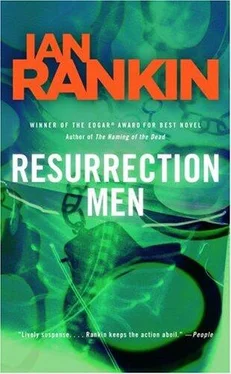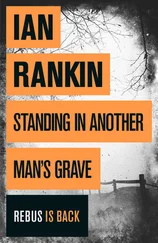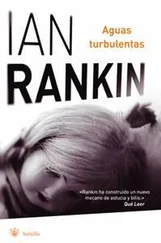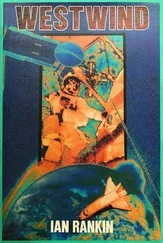“I need to speak to Gill,” Siobhan said quietly, her eyes on Templer’s closed door.
“Going on the sick after all?”
Siobhan shook her head. “I think I recognized Donny Dow. He was the Weasel’s driver the day I went to interview Cafferty.”
Rebus stared at her. “You sure?”
“Ninety percent. I only saw him for a matter of seconds.”
“Then maybe we should talk to the Weasel.”
She nodded. “ After I’ve okayed it with the boss.”
“If that’s the way you want to play it.”
“You said it yourself: this isn’t your patch.”
Rebus looked thoughtful. “What about if you kept it to yourself for the moment?”
She stared at him, uncomprehending.
“What if I talk to the Weasel on the quiet?” Rebus went on.
“Then I’d be withholding information.”
“No, you’d just be withholding an inkling . . . Maybe it’ll take you a day to convince yourself that it was Dow you saw driving the Weasel’s car.”
“John . . .” Without saying as much, she was asking him for something. She wanted him to share, to confide . . . to trust in her.
“I have my reasons,” he said, voice just above a whisper. “Something the Weasel might help me with.”
It took her a full thirty seconds to make up her mind. “All right,” she said. He touched her arm.
“Thanks,” he said. “I owe you. What about something to eat tonight? My treat?”
“Have you called Jean yet?”
His eyes darkened. “I’ve been trying. She’s either out or not answering.”
“ She’s the one you should be asking to dinner.”
“I should have phoned her that night . . .”
“You should have followed her that night, apologizing all the way.”
“I’ll keep trying,” he said.
“And send her some flowers.” She had to smile at the look on his face. “Last time you sent anybody flowers, it was probably a wreath, am I right?”
“Probably,” he admitted. “More wreaths than bouquets, that’s for certain.”
“Well, don’t confuse the two this time round. Plenty of florists in the phone book.”
He nodded. “Straight after I talk to the Weasel,” he said, heading for the corridor. There were some calls that had to be made on a mobile rather than one of the office phones. Rebus now had a list of two.
But the Weasel wasn’t in his office, and the best anyone could do was offer a tepid promise to pass on a message.
“Thanks,” Rebus said. “By the way, is Donny there at the moment?”
“Donny who?” the voice said before cutting the connection. Rebus cursed, went to the comms room for a Yellow Pages, then headed out into the car park to phone a florist. He ordered a mixed bunch.
“What sort of flowers does the lady like?” he was asked.
“I don’t know.”
“Well, what about colors?”
“Look, just a selection, okay? Twenty quid’s worth or thereabouts.” He reeled off his credit-card number and the deal was done. Sliding his phone back into his pocket, switching it for cigarettes and lighter, he realized he had no idea what twenty notes would buy. Half a dozen withered carnations, or some ridiculously huge spray? Whatever it was, it would be delivered to Jean’s home this evening at 6:30. He wondered what would happen if she was staying late at work: would the florist leave them on the doorstep, prey to any passing thief? Or take them back to the shop and try again the next day?
He took a long drag on the cigarette, filling his lungs. Things always seemed to be more complicated than you expected. But then when he thought about it, he was adding the complications himself, looking at what could go wrong with the arrangement rather than hoping for the best. He knew he’d been a pessimist from an early age, realizing that it was a good way to prepare for life. As a pessimist, if things went wrong, you were ready, while if things went right, it came as a pleasant surprise.
“Too late to change now,” he muttered.
“Talking to yourself?” It was Allan Ward, busily loosing a fresh packet from its cellophane bonds.
“What’s up? Has your patter failed to impress DC Hawes?”
Ward started to nod. “She’s so unimpressed,” he said, lighting up, “she’s agreed to have dinner with me tonight. Any tips?”
“Tips?”
“Shortcuts into her knickers.”
Rebus flicked ash from his cigarette. “She’s a good officer, Allan. More than that, I like her. I’d take it personally if she got hurt.”
“Just a bit of harmless fun,” Ward said defensively. Then his face changed to a smirk. “Just because you’re not getting any . . .”
Rebus swung round, grabbing both of Ward’s jacket lapels in one hand, pushing him back against the wall of the station. The cigarette dropped from Ward’s mouth as he tried to push Rebus away. A patrol car was pulling in through the gateway, the uniforms staring out at the spectacle. Then hands were on both men, separating them. It was Derek Linford.
“Ladies, ladies,” he was telling them. “No fisticuffs.”
Ward was rearranging his jacket. “What’re you doing here? Checking under the cars for a missing prisoner?” Flecks of saliva flew from his mouth.
“No,” Linford said, but he shifted his gaze to the car park, just in case . . . “I was actually wondering if any smokers were down here.”
“You don’t smoke,” Rebus reminded him. He was breathing hard.
“I thought maybe I should give it a go. Christ knows, this is as good a time as any.”
Ward laughed, seeming to forget all about Rebus. “Welcome to the club,” he said, offering his packet to Linford. “Templer gave you a hard time, did she?”
“It’s the fucking embarrassment as much as anything,” Linford admitted with a sheepish grin, while Ward lit the cigarette for him.
“Forget about it. Everybody’s saying Dow’s into kickboxing. You don’t want to mess with that.”
Ward seemed to be cheering Linford up. Rebus was wondering about Linford. He’d come across them brawling, yet hadn’t asked why, being busy with his own concerns. Rebus decided to leave them to it.
“Hey, John, no hard feelings, eh?” Ward suddenly announced. Rebus didn’t say anything. He knew that once he’d gone, Linford — now reminded — would probably ask about the fight, and his new best buddy would explain about the night out and Jean.
And suddenly Linford would have ammunition. Rebus wondered how long it would take him to use it. He was even starting to worry about the fact that Linford had been chosen to replace him on the Marber case. Why Linford, of all people? As Rebus walked back into the station, he could feel how the tension was making his every movement more sluggish. He tried rolling his shoulders, stretching his neck. He remembered an old piece of graffiti: Just because you’re paranoid, it doesn’t mean they’re not after you . . . Was he becoming paranoid, seeing enemies and traps everywhere? Blame Strathern, for picking him in the first place. I don’t even trust the man I’m working for, Rebus thought, so how can I trust anyone else? Passing one of the officers from the Marber inquiry, he thought how nice it would be to be seated at a desk in the murder room, making routine telephone calls, knowing how little any of it mattered. Instead, he seemed to be digging himself an ever-deeper hole. He’d promised Jazz an “idea,” a plan to make some money. Now all he had to do was deliver . . .
That evening, Rebus went drinking alone. He’d told the syndicate he had something to do, but might catch up with them later. They were undecided about whether to stay in Edinburgh for a few drinks, or head straight back to Tulliallan. Jazz was thinking of Broughty Ferry, but his car was back at the college. Ward was thinking of treating Phyllida Hawes to a Mexican place near St. Leonard’s. They were still arguing over strategies and alternatives when Rebus slipped away. After three drinks in the Ox, only half listening to the latest batch of jokes, he started feeling hungry. Didn’t know where to eat . . . last thing he wanted was to walk into a restaurant and bump into Ward and Hawes playing footsie under the table. He knew he could cook himself something at home; knew, too, that this wouldn’t happen. All the same, maybe he should be at home. What if Jean rang? Had she got the flowers yet? His mobile was in his pocket, just waiting for her call. In the end, he ordered another drink and the last leftover scotch egg.
Читать дальше












